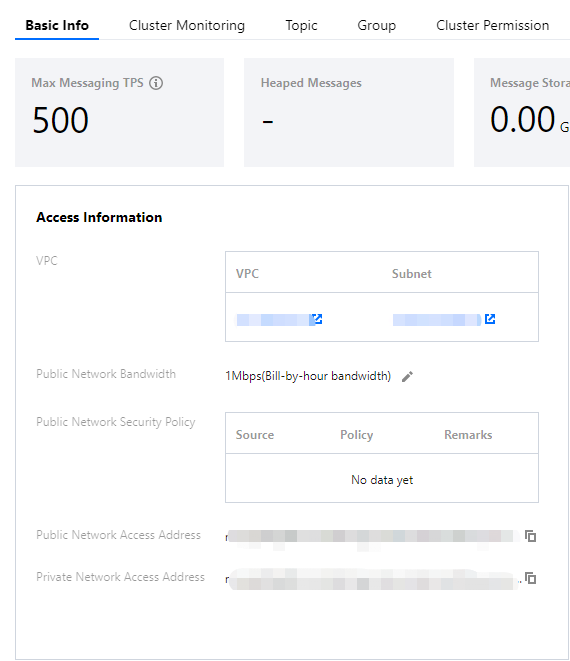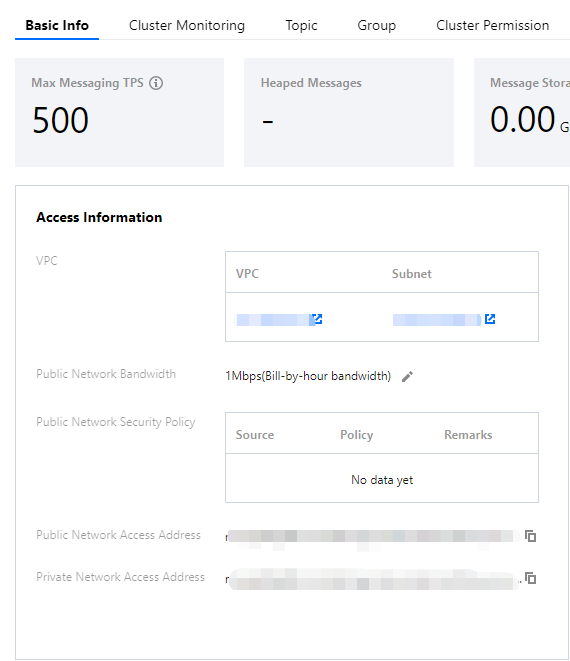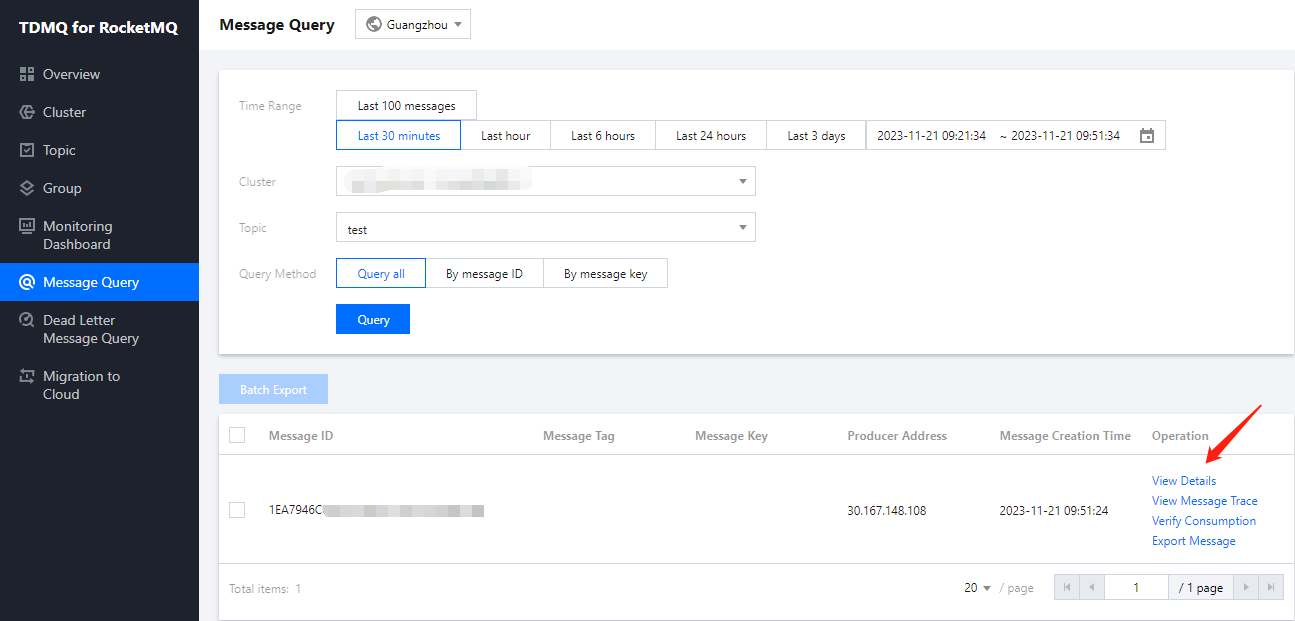- Release Notes and Announcements
- Product Introduction
- Purchase Guide
- RocketMQ 5.x
- RocketMQ 4.x
- Product Introduction
- Purchase Guide
- Getting Started
- Operation Guide
- Development Guide
- SDK Documentation
- Migration to Cloud
- API Documentation
- FAQs
- TDMQ FOR ROCKETMQ SERVICE LEVEL AGREEMENT
- Contact Us
- Release Notes and Announcements
- Product Introduction
- Purchase Guide
- RocketMQ 5.x
- RocketMQ 4.x
- Product Introduction
- Purchase Guide
- Getting Started
- Operation Guide
- Development Guide
- SDK Documentation
- Migration to Cloud
- API Documentation
- FAQs
- TDMQ FOR ROCKETMQ SERVICE LEVEL AGREEMENT
- Contact Us
Overview
This document describes how to use an open-source SDK to send and receive messages with the SDK for C++ serving as example, for you to better understand the complete procedure involved in message sending and receiving.
Prerequisites
Directions:
1. Prepare the environment.
1.1 You need to install the RocketMQ-Client-CPP library in the client environment. Follow the official guide to Install the CPP Dynamic Library.The master branch build is recommended.
1.2 Incorporate the associated header files and dynamic libraries of RocketMQ-Client-CPP into the project.
2. Initialize the message producer.
// Set the producer group nameDefaultMQProducer producer(groupName);// Set the service access addressproducer.setNamesrvAddr(nameserver);// Set user permissionsproducer.setSessionCredentials(accessKey, // Role keysecretKey, // Role name"");// Set the namespace (full namespace name)producer.setNameSpace(namespace);// Ensure that the parameters are set before initiationproducer.start();
Parameter | Description |
groupName | Producer group name, which can be obtained from the Group tab of cluster management on the console. |
nameserver | Cluster access address in the basic information of the cluster. Select either the private network or public network access address as needed.  |
secretKey | Role name, which can be copied from SecretKey on the Cluster Permission page. |
accessKey | Role key, which can be copied from AccessKey on the Cluster Permission page.  |
3. Send the message.
// Initialize message contentMQMessage msg(topicName, // Topic nameTAGS, // Message tagKEYS, // Business message key"Hello cpp client, this is a message." // Message content);try {// Send the messageSendResult sendResult = producer.send(msg);std::cout << "SendResult:" << sendResult.getSendStatus() << ", Message ID: " << sendResult.getMsgId()<< std::endl;} catch (MQException e) {std::cout << "ErrorCode: " << e.GetError() << " Exception:" << e.what() << std::endl;}
Parameter | Description |
topicName | Topic name, which can be copied from the Topic tab on the console. |
TAGS | Used to set the message tag. |
KEYS | Used to configure the message business key. |
4. Release the resources.
// Release resourcesproducer.shutdown();
5. Initialize the consumer.
// Monitor messagesclass ExampleMessageListener : public MessageListenerConcurrently {public:ConsumeStatus consumeMessage(const std::vector<MQMessageExt> &msgs) {for (auto item = msgs.begin(); item != msgs.end(); item++) {// Businessstd::cout << "Received Message Topic:" << item->getTopic() << ", MsgId:" << item->getMsgId() << ", TAGS:"<< item->getTags() << ", KEYS:" << item->getKeys() << ", Body:" << item->getBody() << std::endl;}// Return `CONSUME_SUCCESS` when consumption is successfulreturn CONSUME_SUCCESS;// Return `RECONSUME_LATER` when consumption fails. The message will be re-consumed// return RECONSUME_LATER;}};// Initialize the consumerDefaultMQPushConsumer *consumer = new DefaultMQPushConsumer(groupName);// Set the service addressconsumer->setNamesrvAddr(nameserver);// Set user permissionsconsumer->setSessionCredentials(accessKey,secretKey,"");// Set the namespaceconsumer->setNameSpace(namespace);// Set the instance nameconsumer->setInstanceName("CppClient");// Please register the custom listening function to process the received messages and return the corresponding processing results.ExampleMessageListener *messageListener = new ExampleMessageListener();// Subscribe to the messageconsumer->subscribe(topicName, TAGS);// Set the message listenerconsumer->registerMessageListener(messageListener);// After the preparations are complete, the startup function must be called for normal operation.consumer->start();
Parameter | Description |
groupName | Consumer group name, which can be obtained from the Group tab of cluster management on the console. |
nameserver | Cluster access address, which can be obtained by clicking on Get Access Address in the Operation column on the Cluster Management page.  |
secretKey | Role name, which can be copied from SecretKey on the Cluster Permission page. |
accessKey | Role key, which can be copied from AccessKey on the Cluster Permission page.  |
topicName | Topic name, which can be copied from the Topic tab on the console. |
TAGS | Used to set the tag of the subscribed messages. |
6. Release the resources.
// Release resourcesconsumer->shutdown();
7. After the message is sent, you will receive a message ID (messageID). Developers can query the recently sent messages on the Message Query page, as shown in the following figure. Information such as details and traces for specific messages is also available. For details, see Message Query.

Note:
The preceding sections briefly describe how to publish and subscribe to messages. For more operations, see the Demo or the RocketMQ-Client-CPP Examples.

 Yes
Yes
 No
No
Was this page helpful?